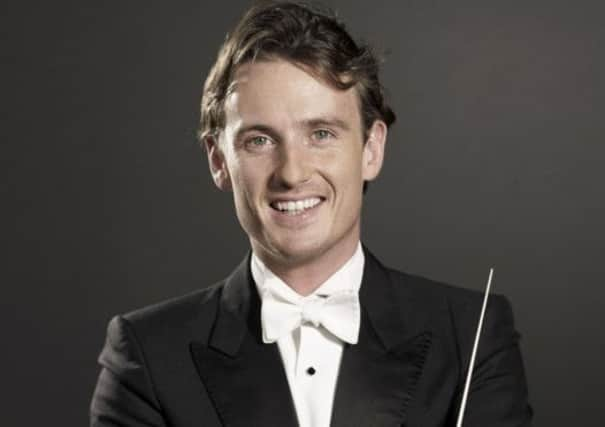Young conductor back with Opera North


Conductor Alexander Shelley has music in his DNA – literally.
The son of professional musicians – both his parents are highly accomplished concert pianists – he says that he started playing the piano “pretty much before I could speak” (it helped that there were five grand pianos in the family home), before taking up the cello at the age of nine.
Advertisement
Hide AdAdvertisement
Hide AdHe went on to study at the Royal College of Music, after which he continued his studies, in cello and conducting, in Germany.
In 2005 he was awarded first prize at the 2005 Leeds Conductors Competition and was described at the time as “the most exciting and gifted young conductor to have taken this highly prestigious award. His conducting technique is immaculate, everything crystal clear and a tool to his inborn musicality.”
Still only 35 years old, his career so far has been very impressive – chief conductor of the Nuremberg Symphony Orchestra for the past five years, he has conducted world-class orchestras around the globe and next September he takes up the post of Music Director at Canada’s National Arts Centre Orchestra. His work also displays, through his extensive engagement with young people, a thoughtfulness and a genuine commitment to developing the next generation of classical musicians and audiences.
He is currently back in Leeds rehearsing with Opera North for the company’s new production of Mozart’s The Marriage of Figaro, directed by Jo Davies, which opens at Leeds Grand Theatre in January. This will be Shelley’s first time conducting an opera in the UK – also his first with Opera North – and he says he is delighted to be involved.
Advertisement
Hide AdAdvertisement
Hide Ad“It was with this orchestra that I won the Leeds Conductors Competition which was a springboard for my career,” he says. “It was really important for me personally and these competitions are an essential part of our armoury as a country if we want to be producing successful young artists. For conductors it’s hard to gain that practical experience and then find an orchestra willing to give you a chance, so competitions like Leeds are invaluable. I hope very much that it can be sustained.”
It was Shelley’s mother who encouraged him to enter the competition and he says he was struck by something she told him afterwards about her experience of the event. “She has been around conductors all her life and she said that she had never realised, just from watching lots of different conductors performing in front of an orchestra, what a difference they made.”
Looking back now he says he can see that conducting was probably always his destiny.
“I first conducted when I was 14 at school and I always wanted to listen to orchestral music, I loved the sound of an orchestra. I started getting interested in scores and how the music was all put together and I enjoyed composition. To this day when I wake up in the morning and I know I have to learn a score that makes me really happy.”
Advertisement
Hide AdAdvertisement
Hide AdWhile most people – even if they are not musical themselves – can make an educated guess at what a musician has to do in the days and weeks before a concert, the process and preparation for conducting remains, pretty mysterious. However, as Shelley describes his routine it becomes clear that, as with all creative endeavours, it comes down to a lot of thought and hard work. “I do a thorough musicological analysis of the piece, basically looking at the technical side of how the music is put together,” he explains. “It’s a little like if you are doing a play – you need, as a director or an actor, to understand all the nuances of what’s happening. You study the form and structure – you can’t separate form or structure from the aesthetic.
“A Shakespeare sonnet is like a movement of Beethoven – you can read it through and understand it but then you can also take apart each section and suddenly it becomes a gem.”
When we meet, Shelley is two weeks into the rehearsal period with Opera North and seems to be thoroughly enjoying it.
“It’s a fascinating process,” he says. “We have an incredibly intelligent cast who are all asking questions and thinking – they are fantastic.” And he is interested in the collaborative nature of opera.
Advertisement
Hide AdAdvertisement
Hide Ad“The difference is that when I am conducting a symphony it is down to my vision of it,” he says. “Whereas when I do an opera I feel like it would be wrong not to completely tie up what I am thinking musically with what the director is thinking about with regards to characterisation.”
The Marriage of Figaro is among the most popular operas and Shelley is clear about why it still holds such appeal for audiences. “First and foremost the characters experience feelings that all of us would experience on a day-to-day basis – like being in love with someone in different ways, feeling insecure, trusting or lacking in trust. It is about the dynamics of a household and it is about individuals trying to deal with very human experiences.
“Mozart had an absolutely extraordinary ability to capture those feelings and emotions.”
• The Marriage of Figaro, Leeds Grand Theatre, January 24 & 30, February 5, 11, 17, 21 & 27. www.operanorth.co.uk